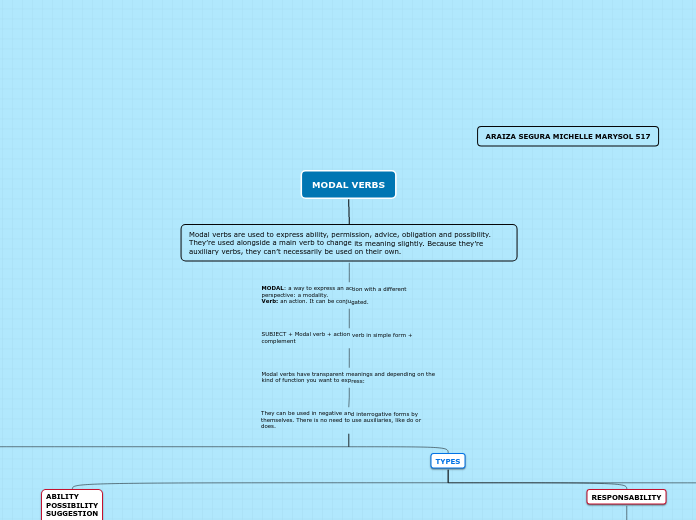
MODAL: a way to express an action with a different perspective: a modality. Verb: an action. It can be conjugated.
SUBJECT + Modal verb + action verb in simple form + complement
Modal verbs have transparent meanings and depending on the kind of function you want to express:
They can be used in negative and interrogative forms by themselves. There is no need to use auxiliaries, like do or does.
CHARACTERISTICS
They do not have an infinitive (for example, there is no to can)
They do not have a gerund (for example, there is no mighting)
They have no participle (for example, there is no willed)
TYPES
ABILITY
POSSIBILITY
SUGGESTION
REQUEST
CAN
Expresses the ability to do an action. It is also used to ask for permission.
Can you open the door?
Request: I am asking politely for help.
They can run in the marathon.
Ability: They have the reparation and skills to run the marathon.
Can she bake a cake?
Asking for ability: I want to know if she has the skills to prepare cake.
We can read books in English.
Ability: They have the ability to perform that skill.
Can I participate in the show?
Asking for permission: I want to know if it is pertinent to be part of the show.
EXAMPLES
I can play the piano: I have the ability to do it.
Can I play the piano?: I am asking for permission to do it.
She can’t speak Chinese.
She cannot speak Chinese.
Can she speak Chinese?
COULD
expresses the possibility to do the action.
She could be my friend.
There is a chance we could be friends.
They could bring more food.
They have the opportunity to bring more.
It could rain today.
There is probability to rain.
EXAMPLES
We could meet up today.
Could you call your mom, please?
SHOULD
expresses the suggestion to do the action and also an opinion.
They should be ready for the winter season.
Opinion: In my opinion they have to be doing something to be ready for the winter.
You shouldn’t wear that dress today. It is a funeral!
Suggestion: It is not acceptable to wear red. In my opinion a black dress is better.
I should study more for the exam.
Opinion: This is something I have to do to improve my school grades.
We should start cooking dinner. Dad is going to be home soon.
Suggestion: We have to do that before dad arrives and scold us.
EXAMPLES
People mustn't smoke in class.
You should listen to me.
Should she doesn’t back?
WOULD
expresses a formal request to do the action.
Note: to express formal request we only use WOULD in the interrogative form.
Would you help me carrying this?
Would it be possible to close the windows?
Would she turn down the volume please?
Would you please close our windows?
When I was in Spain, I would speak Spanish.
I would like you to know the truth.
RESPONSABILITY
The usage of modal verbs must and have to will help you to talk about your own obligations and responsibilities.
MUST
This modal refers to an obligation, similar to “have to” but this comes from the speaker so this is a personal duty that you or a person feels necessary to do it because it is a logical assumption. Besides, it is only used in present and future.
EXAMPLES
I must make sure that my answers are correct before UI hand in the exam.
I must study so hard in order to pass the final exam.
Children must not play with dire.
You must not dria more 25 mph in this zone.
HAVE TO
It is used to talk about obligations and responsibilities but this comes from the outside so this means that someone else requires this and it is a necessity.
This modal verb is considered semi-modal because it needs auxiliaries to make questions or negative sentences in the different tenses it is conjugated.
EXAMPLES
All you have to do, it is to sign some papers.
She had to work hard yesterday.
We have to get up early.
You do not have to ome to school tomorrow.
She doesn't have to work until ten.
POSSIBILITY
GIVE PERMISION
EXPRESS WISHES
PAST ACTIONS
Can normally be interchanged without a significant difference in meaning.
MIGHT
Often implies a smaller chance of something happening (when expressing possibility).
EXAMPLE
He might come tonight.
You might as well try to open and get in the car.
MAY
Used when expressing wishes or giving permissions.
EXAMPLE
May I speak now?
We may go to the college tomorrow.